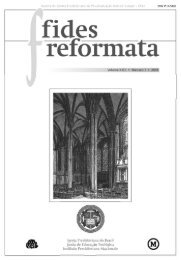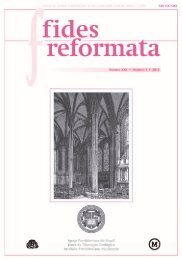Fides 22 N2
Um publicação do Centro Presbiteriano de Pós-graduação Andrew Jumper.
Um publicação do Centro Presbiteriano de Pós-graduação Andrew Jumper.
You also want an ePaper? Increase the reach of your titles
YUMPU automatically turns print PDFs into web optimized ePapers that Google loves.
ELIAS MEDEIROS, THE REFORMERS AND MISSIONS<br />
It seems that no comment of Luther would convince Warneck of the<br />
reformer’s vision for preaching the gospel to all nations. Warneck always finds<br />
a way to dismiss his “mission” ideas. An example is his quoting the following<br />
from one of Luther’s Ascension sermons:<br />
“Go into all the world” raises a question ... as to how it is to be understood and<br />
held fast, since verily the Apostles have not come into all the world, for no<br />
Apostle has come to us, and also many islands have been discovered in our day<br />
where the people are heathen and no one has preached to them: yet the scripture<br />
saith their voice has sounded forth into all lands. Answer; their preaching has<br />
gone out into all the world, though it has not yet come into all the world. That<br />
outgoing has been begun and gone on, though it has not yet been fulfilled and<br />
accomplished; but there will be further and wider preaching until the last day.<br />
When the Gospel has been preached, heard, published through the whole world,<br />
then the commission shall have been fulfilled, and then the last day shall come. 10<br />
Warneck even declares that “these and similar sayings... are repeatedly<br />
found” throughout Luther’s writings. After quoting Luther, however, and<br />
making such statements regarding his writings, Warneck immediately dismisses<br />
the Reformer’s commitment to the preaching of the gospel to the nations<br />
by claiming “here again there is no reference to any systematic enterprise.” 11<br />
Another clear example of his preconceived attitude toward the reformers<br />
is observed in Warneck’s comments on Zwingli’s position. Warneck quotes<br />
the reformer: “[There are apostles still, and] their office is ever to go among the<br />
unbelieving, and to turn them to the faith, while the bishop remains stationary<br />
by those committed to his care.” 12 He also highlights Zwingli’s express assertion<br />
that the New Testament apostles “did not go everywhere; and he [Zwingli]<br />
infers from this that the work of world-missions which was begun by them<br />
must be continued.” 13 Saying that Zwingli “does not draw the conclusions”<br />
(perhaps, to send missionaries?), the German missiologist then offers the<br />
following theoretical conclusion:<br />
At best his view can be thus explained: if in the present time messengers are<br />
willing to go at their own risk beyond the bounds of Christendom, they ought to<br />
be certain that they have the call of God to their mission, but in what he says there<br />
is not a word as to the duty on the part of the church to send out missionaries. 14<br />
Warneck falls prey to one of his own criticisms toward scholars who<br />
defend the missionary ideas of the reformers. He earlier dismisses scholars<br />
10 Ibid., 14<br />
11 Ibid., 14.<br />
12 Ibid., 19.<br />
13 Ibid., 19.<br />
14 Ibid., 19.<br />
142




